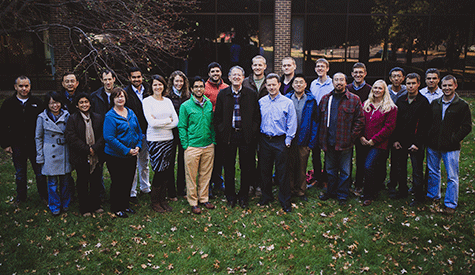A new center at Washington University School of Medicine in St. Louis aims to tackle the challenges of feeding the world’s rapidly expanding population and improving global health by linking efforts to develop more nutritious foods with discoveries gleaned from the gut microbiome.
The Center for Gut Microbiome and Nutrition Research will be led by Jeffrey I. Gordon, MD, whose pioneering studies have illuminated the intimate relationship between diet, the mix of microbes that live in the intestine and overall nutritional health.
His laboratory’s research has focused on two major global health problems: obesity in Western societies and childhood malnutrition in developing countries. The groundbreaking work has demonstrated that the state of the gut’s microbial community is closely tied to both conditions.
“We’re witnessing dramatic alterations in how and what we eat, with a move toward more processed foods that have longer shelf lives, and a rise in snacking compared with declines in family dining,” said Gordon, the Dr. Robert J. Glaser Distinguished University Professor, who also directs the Center for Genome Sciences and Systems Biology at the School of Medicine.
“At the same time, brisk population growth together with climate change and a lack of sustainable agricultural practices spur the need to innovate and develop new types of affordable, more nutritious foods. Our evolving understanding of the workings of the tens of trillions of gut microbes and their genes should play an important role in this effort,” he added.
As cultural traditions give way to globalization, much of the world is experiencing dietary shifts that are accompanied by alarming increases in obesity, diabetes, cardiovascular disease, inflammatory bowel diseases and other disorders.
St. Louis is well-known as a center for agricultural technology. “Agriculture, food and sustainability have been on the minds of St. Louisans for a long time, and we want to add in the element of the gut microbiome,” Gordon said.
A major focus of the new center will be to integrate the evolving understanding of human gut microbes and their genes (the microbiome) with efforts to identify new food sources, food production methods and nutritional guidelines. The center will be guided by its humanitarian goal of helping the world’s most vulnerable populations achieve healthier societies in the 21st century.
Our own human health is closely linked to our microbial health. In the human body, microbial cells and their genes far outnumber human cells and genes. The largest collection of microbes live in the gut, where they play a critical role in transforming components of food into products the body can utilize, and synthesizing nutrients such as key amino acids and vitamins. Diet greatly influences gut microbial communities in a relationship that normally is dynamic, adaptive and highly beneficial for humans.
Gordon’s work has demonstrated that the nutritional value and biological effects of food vary among people, based on differences in the makeup of their gut microbial communities. Next-generation nutritious foods should be designed from the “inside out,” he said, based on the way they interact with the gut communities of people of different ages, states of health, lifestyles and cultural traditions.
He and his students have shown that the gut microbial communities of malnourished infants and children in Africa and south Asia don’t mature along a normal trajectory and that standard treatment with nutrient-rich therapeutic foods can’t fully or permanently repair this immaturity.
Their findings suggest that proper development of the gut microbial community is necessary for healthy growth and may explain why millions of malnourished children suffer from persistent stunted growth, along with immune system and neurodevelopmental abnormalities.
With the support of the Bill & Melinda Gates Foundation, they are seeking to develop new food interventions and microbial therapies to more effectively treat and ultimately prevent childhood malnutrition and its associated health problems.
Parallel efforts by Gordon are directed at repairing the gut microbiomes of obese individuals, whose gut ecosystems suffer from a loss of microbial diversity.
“Achieving and sustaining the center’s goals requires that we educate talented students in innovative ways so they can successfully engage in the interdisciplinary work encompassed by our mission,” Gordon said. “We also must forge alliances with groups across Washington University, as well as with other academic and nonacademic groups in countries with food and nutritional health challenges emanating from globalization and issues of sustainability. Social and economic innovations also are essential so that discoveries in this area will have lasting value.
“This type of innovation requires engagement with local, national and international companies in ways that will allow a scaling up of food production to serve people in need representing a range of socioeconomic conditions, cultural traditions, geographies and health needs,” he added.
The new center was established, in part, with a gift from Mars Inc., the global food manufacturer. Harold Schmitz, chief science officer at Mars, noted that the center’s humanitarian mission “very much aligns with our company’s long-standing, global view of the challenges faced by the planet in the coming decades and the need to find solutions based on strategic investments in talented people and promising technologies. We hope our support will inspire others to contribute to this center, which will operate at the critical nexus of food, agriculture and nutrition.”
The new center will occupy space in and leverage the resources of the Center for Genome Sciences and Systems Biology.

Washington University School of Medicine’s 2,100 employed and volunteer faculty physicians also are the medical staff of Barnes-Jewish and St. Louis Children’s hospitals. The School of Medicine is one of the leading medical research, teaching and patient-care institutions in the nation, currently ranked sixth in the nation by U.S. News & World Report. Through its affiliations with Barnes-Jewish and St. Louis Children’s hospitals, the School of Medicine is linked to BJC HealthCare.